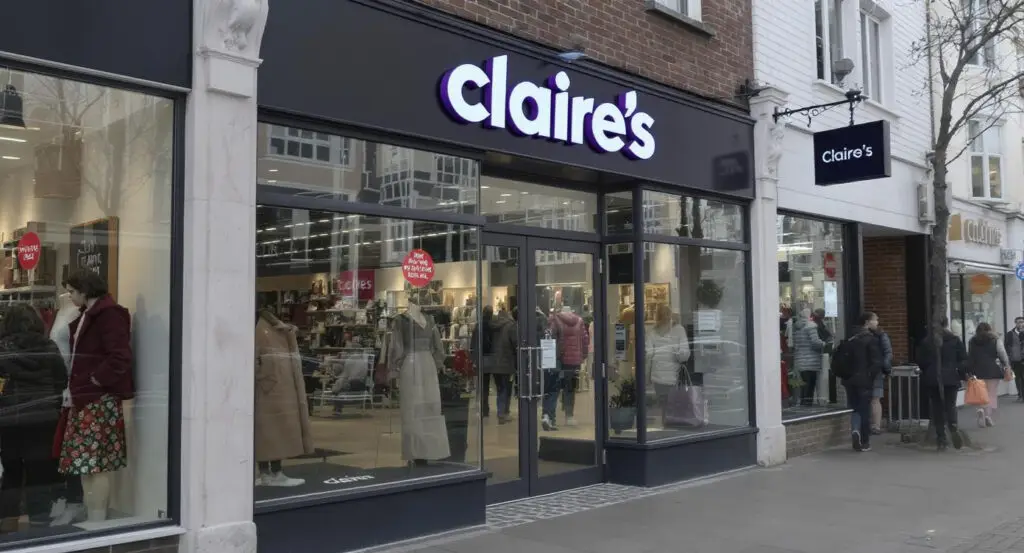Claire’s Accessories Faces Uncertainty After US Parent Files for Bankruptcy
The future of the high street chain Claire’s Accessories has been cast into doubt after its American parent company filed for bankruptcy for the second time. Although the UK arm of the business is not directly affected by this filing, its fate remains under review after repeated attempts to sell the 280-store UK business have so far failed. This news has created a shadow over the brand, which holds a nostalgic place for many, being the go-to destination for first ear piercings, scrunchies, and trendy hair clips for young people.
The company’s struggles are attributed to rising debt and dwindling footfall, reflecting a broader trend of challenges for high street retailers in the post-pandemic era. Sources familiar with the matter suggest that a UK administration filing is becoming increasingly likely and that some stores could close as part of a potential restructure or sale. This development has created a sense of unease among employees and customers, who are now anxiously awaiting more information on the company’s future. The uncertainty highlights the fragile nature of many high street chains and the challenges they face in adapting to changing consumer habits and economic pressures.
A History of Financial Struggles and the Latest Chapter
Claire’s has filed for bankruptcy for the second time in seven years, indicating persistent financial struggles that predate the current economic climate. The company’s CEO, Chris Cramer, emphasised the need to restructure operations and the severity of the financial situation. The UK arm is currently undergoing a strategic review, and the failure to find a buyer for the 300-store British business adds uncertainty.
The stalling of negotiations for a sale or restructuring is a serious setback, and the possibility of administration in the UK raises fears that some locations, including the two branches on the Fylde coast in Blackpool and Fleetwood, could be vulnerable to closure. All UK stores remain open, but more updates are expected in the coming months as the business navigates this critical phase.
The Fylde Coast Stores and Local Economic Concerns
The closure of two Claire’s stores in Blackpool and Fleetwood, located in the Houndshill shopping centre and Affinity Lancashire shopping village, could significantly impact local retail. The closure would be a blow to local communities and government bodies, as they work to maintain a vibrant retail environment.
The uncertainty surrounding these stores highlights the challenges faced by high street chains in adapting to changing consumer habits and economic pressures. The strategic review will directly impact these locations and the broader high street landscape, particularly for small businesses that rely on larger retailers’ footfall. The potential loss of Claire’s would symbolise the larger struggles facing retail in the region.
The Broader Context of High Street Retail Challenges
The troubles facing Claire’s Accessories are not an isolated incident but are indicative of a broader crisis facing high street retail in the UK and globally. In the post-pandemic era, consumer habits have shifted dramatically towards online shopping, putting immense pressure on physical retail stores. High street chains are struggling with rising operational costs, including rent and business rates, while simultaneously facing dwindling footfall. The nostalgia for brands like Claire’s Accessories is often not enough to sustain them in a competitive market where digital-native brands and fast fashion retailers are dominating.
This broader trend means that the challenges faced by Claire’s are shared by many other retailers, and a potential administration filing would be another example of the systemic issues facing the high street. This situation underscores the need for a fundamental shift in how physical retail operates, with an emphasis on creating more compelling in-store experiences and integrating seamlessly with online platforms to remain relevant in a modern economy.
What a UK Administration Filing Could Mean
If Claire’s Accessories UK were to enter administration, it would be a significant legal and financial event. Administration is a process where a company facing financial difficulties is placed under the management of an insolvency practitioner. The administrator’s primary goal is to save the company or its business as a going concern. This could lead to a restructuring of the business, a sale of its assets to a new owner, or, in the worst-case scenario, a liquidation of the company’s assets. For the UK stores and employees, this would mean a period of high uncertainty.
The administrator would review the profitability of each store, and closures would be a distinct possibility, particularly for underperforming locations. However, it could also lead to a rescue plan, where a new owner or a restructured company emerges, preserving a portion of the business and its jobs. The outcome is never certain, but a filing for administration would signal that the business has reached a critical point and requires a formal intervention to determine its future.
High Street Challenges The Future of Claire’s UK
The coming months will be crucial for the future of Claire’s Accessories in the UK. The ongoing strategic review and the outcome of the US parent company’s bankruptcy proceedings will largely dictate the path forward. The failure to find a buyer for the British business is a major obstacle, but it does not mean that all hope is lost. A new buyer could still emerge, perhaps one with a fresh vision and the capital to invest in a brand that still holds cultural relevance.
Alternatively, a restructuring under administration could provide the company with a new lease on life, allowing it to shed debt and unprofitable stores to emerge as a leaner, more focused business. For now, all UK stores remain open, but the high level of uncertainty means that employees, customers, and local communities are all bracing for what comes next. The situation is a stark reminder of the challenges of operating a high street retail chain in a competitive, post-pandemic market and the need for constant innovation and adaptation to survive.
Read More: AI Tools: UK Startups Get Boost from NatWest and Google























